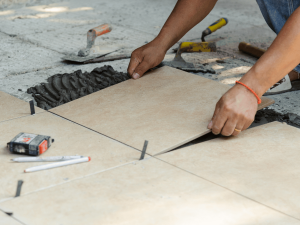Choosing the right flooring option is crucial for both residential and commercial properties. But have you ever wondered if resin flooring is a more budget-friendly option compared to traditional tiles? The quick answer is yes, resin flooring can indeed be cheaper than tile, but the ultimate cost depends on various factors.
We’re diving into the specifics, comparing costs, benefits, and long-term value to help you determine whether resin flooring is the right choice for your home or business.
Cost Comparison: Resin vs. Tile
Resin Flooring
Resin flooring, particularly epoxy, is generally more budget-friendly compared to tile flooring. The cost of installing resin flooring in the UK ranges from £7 to £100 per square meter, depending on the type and quality of the resin used. Basic epoxy resin floors can cost between £20 to £50 per square meter, while high-performance options can range from £85 to £150 per square meter. The average cost for standard epoxy resin flooring is around £50 to £85 per square meter.
Tile Flooring
In contrast, tile flooring tends to be more expensive. The cost of installing ceramic tiles starts from £10 per square meter and can go up to £100 per square meter for high-quality porcelain tiles. The detailed and precise installation process of tiles also requires skilled labour, which increases the overall cost.

Material Costs
Resin Flooring: The materials used in resin flooring, such as epoxy or polyurethane, are generally more affordable than high-quality tiles. Basic resin materials are cost-effective, but prices can increase with more advanced formulations that offer additional benefits like UV resistance or anti-slip properties.
Tile Flooring: Tiles come in a variety of materials, including ceramic, porcelain, and natural stone. Basic ceramic tiles might be less expensive, but the cost rises significantly with premium options like porcelain or marble. Additionally, the cost of grout and other materials must be factored in.
Installation Costs
Resin Flooring: The installation process for resin flooring is typically quicker and simpler, which can help reduce labour costs. The process involves pouring and spreading the resin mixture, which then hardens to form a seamless surface. This can often be completed in a shorter time frame compared to tiling.
Tile Flooring: Tile installation is labour-intensive, requiring precise placement, cutting, and grouting. Each tile must be carefully positioned and secured, which can be time-consuming and costly in terms of labour. Additionally, the complexity of the tile pattern can further increase the installation time and cost.

Are Resin Floors Worth It?
Beyond initial costs, it’s crucial to consider the long-term value of your flooring choice. A few reasons why resin floors might be worth the investment:
Durability and Maintenance
Resin Flooring: Resin floors are known for their durability and low maintenance requirements. They are resistant to stains, scratches, and spills, making them ideal for high-traffic areas. The seamless nature of resin flooring means there are no grout lines to clean, reducing maintenance efforts. Resin floors can last for years without significant maintenance, contributing to their cost-effectiveness over time.
Tile Flooring: Tile flooring, while durable, is more susceptible to cracks and damage, especially if heavy objects are dropped on them. The grout lines between tiles can attract dirt and become stained, requiring regular cleaning and maintenance. Although tiles are generally water-resistant, the grout is not, which can lead to issues if water penetrates these areas.
Aesthetic and Functional Benefits
Resin Flooring: Resin flooring offers a sleek, modern look with a seamless finish that’s difficult to achieve with tiles. It’s available in a wide range of colours and finishes, including glossy, matte, and textured options. This allows for customisation to match your interior design perfectly. Additionally, resin floors can incorporate decorative elements like flakes or metallic pigments, adding a unique touch to your space.
Tile Flooring: While tiles also come in various styles and can offer a classic or traditional look, achieving a seamless appearance is nearly impossible due to grout lines. The variety in tile designs is extensive, but each tile’s individual placement can disrupt the visual flow of the floor.
Resale Value
Tiles can retain resale value, especially antique or heritage tiles, which can be resold if you decide to renovate or redecorate your property. This is an advantage that resin flooring does not typically offer.
Longevity and Resilience
Resin Flooring: Resin floors are extremely durable and can last for many years with proper care. They are resistant to most chemicals and are not easily damaged by impacts or heavy loads. This resilience makes them suitable for high-traffic areas and industrial environments.
Tile Flooring: Although tiles are durable, they can be prone to cracking or chipping, especially if heavy objects are dropped on them. Grout lines can also deteriorate over time, requiring regrouting to maintain the floor’s appearance and functionality.

Long-Term Costs
When considering the life cycle costs, resin flooring tends to show savings in the long term compared to tile flooring. The durability and low maintenance of resin floors mean fewer repairs and replacements over time. In contrast, the ongoing maintenance and potential repairs for tile flooring can add up, making it more expensive in the long run.
Environmental Impact
Resin Flooring: Resin flooring tends to have a lower environmental impact compared to tiles. The production process for resin materials consumes less energy and generates fewer emissions. Additionally, some resin products are made from eco-friendly materials, further reducing their environmental footprint.
Tile Flooring: The production of ceramic and porcelain tiles involves high energy consumption and significant CO2 emissions (Ceramic Tile Institute of America). The extraction and processing of raw materials, such as clay and stone, also contribute to environmental degradation. However, some manufacturers are adopting more sustainable practices, so it’s worth considering the source of your tiles.
Conclusion
In summary, resin flooring is generally cheaper than tile flooring in terms of initial installation costs in the UK. It also offers significant savings in maintenance and long-term costs due to its durability and low maintenance requirements. While tile flooring has its own advantages, such as potential resale value and aesthetic appeal, resin flooring stands out as a cost-effective and practical option for many applications.
By considering both the initial and long-term costs, as well as the maintenance and durability of each option, it is clear that resin flooring is a more economical choice compared to tile flooring in the UK.

